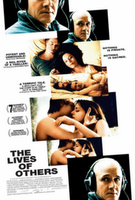 This year’s crop of Oscar contenders has been an underwhelming lot, but there is a bright spot. One of the nominees for best foreign language film, The Lives of Others (Das Leben der Anderen), offers profound insight into the nature of totalitarian systems and the human desire for freedom—and it actually comes from Germany.
This year’s crop of Oscar contenders has been an underwhelming lot, but there is a bright spot. One of the nominees for best foreign language film, The Lives of Others (Das Leben der Anderen), offers profound insight into the nature of totalitarian systems and the human desire for freedom—and it actually comes from Germany.It is 1984 in East Berlin. The Communist Party rules through fear, using the Stasi, the State Security force, as their instrument of terror. Those of an artistic bent are most likely to be targets of Stasi surveillance, which usually leads to interrogation and internment in the feared Normannenstrasse headquarters. Ulrich Mühe plays Capt. Gerd Wiesler, a faceless Stasi functionary, who excels at his duties. However, during a routine assignment watching writer Georg Dreyman and his actress girlfriend Christa-Maria Sieland, played by Sebastian Koch and Martina Gedeck respectively, Wiesler experiences a gradual awakening of his conscience. As Dreyman, a former darling of the Cultural Ministry, conspires to write an expose for the western press, Wiesler takes tentative steps to protect his would be quarry.

Much has been said about Hannah Arendt’s concept of the banality of evil. Lives essentially portrays the converse: a cog in the wheel of an evil system, who comes to the realization that he can no longer actively participate in the Stasi’s crimes.
Writer-director Florian Henckel von Donnersmarck visited the GDR on several occasions as a child, and clearly the experiences had a lasting impression. His story is also well informed by the samizdat literary tradition. No aspect of Socialist (and it is explicitly identified as such) rule is romanticized—the atmosphere of fear is unrelenting. He truly captures oppressive environment of East Berlin, from the washed out colors to the Brutalist architecture, fitting for a brutal system.
On one level, Lives is quite effective as a kind of spy thriller, creating quite a bit of suspense. It is also a story of tragedy compounded, in which suicide is an important theme. Yet FHVD’s moving script concludes on an elegant note. The acting is first rate, particularly Mühe and Koch. Gabriel Yared’s score, including the crucial “Sonata for a Good Man,” perfectly fits the on-screen action. Appropriately, it was recorded by the Prague Symphony Orchestra.
This is an exceptional film, and clearly the class of the Oscar field. Whether the Academy concurs is another matter, but this is a film that deserves a campaign on its behalf. Released by Sony Pictures Classics, it opens in New York (at the Angelika) and in Los Angeles on February 9, unrolling around the country later. Viewers who seek it out will be well rewarded for their efforts.
(Welcome Gateway Pundit readers, you won't be dissapointed when Lives rolls out nationally.)